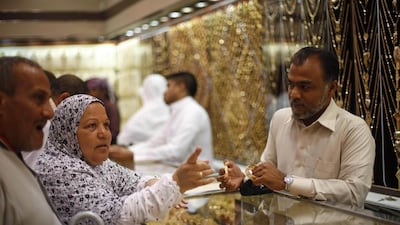MECCA // Economic hardships brought about by Arab Spring uprisings have taken a toll on jewellery retail trade in Mecca, slashing gold sales by more than half compared to the same period last year.
Visitors from Arab countries traditionally buy jewellery during the Haj, often taking home necklaces, rings and bracelets to loved ones.
Figures were not immediately available on the value of gold sales, but traders say the Haj season is traditionally the busiest for dozens of shops just outside the Grand Mosque, Islam’s holiest site, whose windows glitter with bracelets, necklaces, rings, earrings, lockets and chains.
Residents say up to 2 million pilgrims from outside Saudi Arabia usually spend the first few days looking for gifts and souvenirs to take home before Haj rituals start.
While restaurants and food stalls near the Grand Mosque remain busy, gold stores were empty, with shopkeepers looking bored, flicking through magazines and playing with mobile phones.
“Gold sales have really taken a hit, I would say the market is down by more than 50 per cent compared to the last Haj season,” Mohammed Al Himms, store manager at MS jewellery outside Mecca’s Grand Mosque, said.
About 40 per cent of his business was with Egyptian pilgrims, who had for long been some of his main customers, he said, “but now because they have been affected by the Arab Spring they don’t have any extra money to spend on gold.”
Mohammed Abduallah, the branch manager at Thabit Gold and Jewellery, another shop outside the Grand Mosque, said cheaper world gold prices this year had failed to translate into retail sales.
“Gold is considered a luxury and even with the prices being lower, people from these Arab Spring countries don’t have enough income to spend at our stores.”
Bullion prices in the Mecca retail markets this year are around 160 riyals (Dh156) per gram compared to around 200 riyals last year.
Other retailers in the market attributed the drop in sales to construction work to expand the holy mosque grounds.
Pilgrims’ lodgings have been moved from the market and barriers placed around some of the entrances making it difficult for visitors to reach the area.
“So we get less people coming here,” said Jalal Al Amiri, the shop manager at Al Romaizan retail gold store near the Grand Mosque.
Saudi Arabia’s religious authorities had also approved a request by the government to reduce the number of pilgrims to Mecca this year because of the Grand Mosque expansion work.
The decision reduced the numbers from abroad by a fifth and from inside Saudi Arabia by half.
“The lower number of pilgrims coming in has also affected our business badly,” Mr Al Amiri said.
Last year more than 3 million pilgrims travelled to Mecca for the pilgrimage, this year the numbers show a decline of around 1 million pilgrims.

